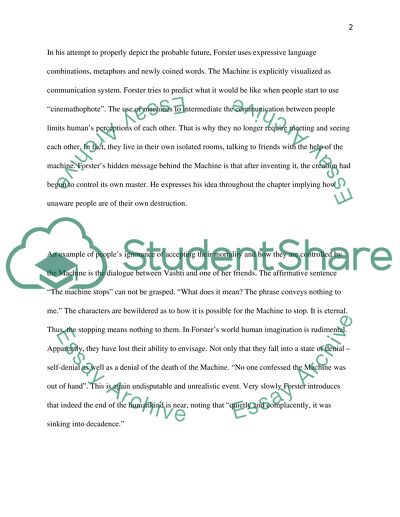
To be sure, not all of Wells’ tales featured marvelous machines “The Country of the Blind” and “The Flowering of the Strange Orchid,” for instance, are more akin to horror literature, exploring a journey to a curious but chilling isolated society in the former and a blood-drinking plant in the latter. Wells is often popularly thought of as a writer whose stories captured the wonder of technologies that did not as yet exist, associating scientific innovations with societal progress as a whole. Indeed, Forster declared in an introduction to his Collected Short Stories that “‘The Machine Stops’ is a reaction to one of the earlier heavens of H.G.

Wells, one of the few writers of scientific romances-the term that was most frequently used to describe works, like Jules Verne’s novels, before “science fiction” became the norm in the 20th century-that Forster was known to have read. In these ways, the story seems chillingly prescient, capturing dim-but-definite elements of the world we inhabit today, like an astronomer peering through a faintly clouded lens. People live in isolation in chambers, where they can call up music and real-time video-chatting at a click the Earth’s surface is, authorities declare, uninhabitable, so people are advised to stay in their cozy rooms, which everyone has adapted to as their standard for normality. In particular, it predicted computer interfaces and programs like Skype that would allow us to communicate with people across the globe without leaving our rooms. “The Machine Stops” would become famous a century after its publication for supposedly having envisioned technologies like social media-and the dangers thereof-long before they appeared. Still, that Forster dabbled in the genre wasn’t really that surprising, given his range as a writer, from his more realistic novels of social critique, like A Room with a View and Howards End, to his posthumously published narrative of queer desire, Maurice, or his more fantastical stories, like “The Celestial Omnibus.” Forster delighted in moments of fantasy in his fiction, and so, in some ways, “The Machine Stops” was right up his aesthetic alley. Each idea appears-in its own way-in one of Forster’s most curious short stories, “The Machine Stops.” All the more remarkable was the fact that Forster was not a science-fiction writer “The Machine Stops” would be his only entry in the genre.


In 1909, long before the invention of the World Wide Web or the prospect of a world where we must live socially distant from each other, the English writer E.M.


 0 kommentar(er)
0 kommentar(er)
